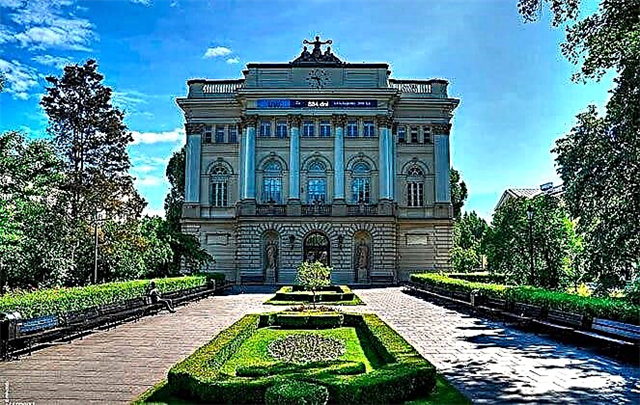The educational system in Germany is one of the most solid in Europe. Nowadays, modern teaching techniques are being introduced into German schools and universities, starting from proven methods. And most importantly, European education can be obtained free of charge.
Distinctive features of education in Germany
Pedantry allowed building a powerful knowledge base, putting it into stages, concentrating on the result. The similarity of the German educational system is similar to the educational structures of other countries. So, children first go to a nursery school, kindergarten, then to school, and finish their studies, receiving a diploma of higher education. But those who do not have such an opportunity can stop at secondary vocational education.

The structure of education in Germany is divided into:
- preschool;
- initial;
- the average;
- secondary vocational;
- higher.
The differences between the German system are more pronounced, since for Russians and residents of the countries of the former CIS, this is new. Peculiarities:
- There is a postgraduate dual stage. This is a well-known nuance of the modern scheme. Combines theory and practice. The student works under a contract in the employer's company and gets a good experience at the place of the future service.
- The German structure allows for quality education at all stages. Many people from abroad wish to study in Germany. And if schools are not yet being taken by storm, the universities are overcrowded. Online lectures are practiced to save space in classrooms.
- School education is free. The rule applies to everyone, including foreigners. The conditions for admission are the same, it is enough to speak English and German.
- Strict discipline: if a child does not show up to school without an official certificate from a doctor or notification of a competition, then a police squad will go home to him. This rule works until the applicant reaches the age of 18.
The advantages of the educational process prevail over the disadvantages, but you should still know about them in order to make an important decision about moving and getting an education in a country with a different mentality.
Pros:
- Availability (only 5% private schools).
- There is preschool preparation for the first grade.
- Homework and grades only from third grade.
- Depending on the desire to get higher education, a suitable level is chosen in secondary school.
- They are admitted to the highest level according to the results of a single exam, which they pass upon graduation from school.
Minuses:
- Overcrowded classrooms in universities do not allow the entire stream of students to attend lectures at the same time.
- Communication with the teacher is limited due to the overload of the teaching staff.
- Since 2007, state funding has been partially provided.
You May Also Like
Stages of education in Germany
Compulsory education does not include preschool education. Kindergartens in Germany are private and are not directly related to the education system. In fact, the staircase consists of an initial, middle, upper and dual steps. Children study within the walls of the school from 12 to 13 years old, and they do not stop studying at the university until the student passes the exams with high quality.
Preschool
All German parents are familiar with the endless queue for a place in kindergarten. Preschool prices are high, which is why many working mothers find it more profitable to invite a nanny.
The German system of upbringing children is distinguished by its fundamental detachment from preparation for school. Children are taught in a playful way to perceive the world around them adequately, to express their thoughts orally, to expand their vocabulary, to devote time to mobility, coordination in sports exercises, and are introduced to art.
If the child is provided with a place for a full day, then at lunchtime he is taken from the garden, and then returned to the group again, since hot meals are not provided in preschool institutions.
But a preschool structure is not at all required. Parents can decide for themselves whether to send a child there or not, and also choose a stage based on the child's preparedness.

Depending on the age and degree of preparation of the kid, the kindergarten includes:
- Nursery (Kinderkrippe) - the first step for infants from 2 months to 3 years. Here the children are fed according to the regime, they are taught to the skills of hygiene, they develop speech and motor skills.
- Kindergarten (Kindergärten) - more often than not, children get right here, bypassing the first level. The reason is hidden in the catastrophic shortage of places in the institution, despite the active support of the state and the board of trustees. Literacy classes for passing entrance examinations for admission to school are not included in the mandatory list of services of the institution. The training hours are paid separately, or after 5 years the baby goes to the preparatory course.
- Preschool classes (Vorklassen or Schulkindergärten) differ from each other only in that in the second variant the child goes directly to a specific school, in which the preparation takes place. The student will not take the entrance tests after the successful completion of the course.
Initial
The good thing about the German system is that if a child is not ready for school, he can be additionally left to prepare for 1 or 2 years. Upon reaching the age of 6 years, the child should perceive information in 15 minutes, be active, have an interest in communication and interaction in team games.
But in the absence of a desire for development and poorly developed communication skills, the baby is sent to a preschool class at an educational institution for a year. Therefore, to enter school, you need to pass a test, a conversation with a teacher-psychologist and a test for primary knowledge.
You May Also Like
A child from 6 to 11 years old can enter the initial stage. But in some regions of the country, such as Brandenburg and Berlin, they allow this to be done in the interval from 6 to 13 years.
The average
This type of education is equated to Russian schools and gymnasiums. School can be completed both completely and up to the general level. Completion of the full school guarantees the acquisition of a specialty, but the knowledge base will be equal to the completion of the courses.
Secondary education includes the following types:
- gymnasium (high level of training and aesthetic education);
- real (provides basic knowledge in the areas of trade, services, government departments);
- basic (for students who do not plan to continue their education at the university);
- general (universal direction - combines the humanities, exact and natural sciences);
- professional (gives a certain craft in hand: accounting, accounting and auditing, taxation; there is no opportunity to get a higher education).
Graduation from a German gymnasium is equivalent to the transition to the 3rd year of a Russian institute. Public education in Germany is provided free of charge, but despite this, the first two stages are compulsory for admission. Also, the gymnasiums are subordinate to the regional authorities of the lands on a territorial basis. So, the schedule and school charter depend on the affiliation to a particular municipality.

International schools allow admission on a common basis of foreign citizens with poor knowledge of German and English. There they will raise their basic knowledge to a higher level, which will help students in the future when looking for work and life abroad in general. If you wish, you can obtain emigrant benefits and get a quota for free education under this program. This list contains 1% Russian-speaking establishments.
Private classes and boarding schools are only partially subsidized by the state. Training in such conditions will cost a decent amount. The prestige of these establishments is at a high level, and their number is no more than a dozen throughout the country.
Secondary vocational
Unlike secondary education, here the specialty can be studied more broadly and the knowledge base will increase, and this will increase the chance of successfully passing the exams before entering the university.
Disciplines at this level include:
- general education subjects (art, sports, religion, music);
- native language (German) and two foreign languages to choose from;
- natural (physics, chemistry, biology);
- accurate (mathematics, economics);
- humanitarian (geography, history, politics).
In our country, medical academies and law universities, after a general course in the last two, choose a specific direction in their activities. In Germany, however, this applies to all areas of education. After 6 years of study, one of four directions is determined:
- technical;
- linguistic;
- musical and artistic;
- socio-economic.
After grade 10, a graduate of a real school continues his education in a college, vocational school or high school.
Higher
A distinctive feature of higher educational institutions in Germany is the "principle of academic freedom." The applicant has the right to independently choose directions from the list of proposed disciplines and how many hours to devote to classes per day.

Table 1. Types of German universities
| A type | Direction | Duration of training | Percentage of the total number of establishments,% |
| The university | A versatile set of disciplines from the exact to the natural sciences | 6 years | 20 |
| Technical University | Exact sciences, economics, management faculties, finance | 6 years | 10 |
| Institute | Practical orientation of training, a combination of internships with theory, graduates go to work in the industrial sector, engineering specialties, software. | 3-4 years | 50 |
| Musical | Media trends, vocalists, instrumentalists, composers | 5 years | 5 |
| Administrative | Managers and managers | 5-6 years old | 10 |
| Institute of arts | Art specialties, architects, designers | 5-6 years old | 5 |
Master's and other postgraduate education
The magistracy is attended by future researchers, children planning to engage in research activities, inventions, applied economics, and politics. At the beginning, it was said about the innovation of the German system of postgraduate training, which is called Dual. This is the principle of 2 years of study with a potential employer, which makes it possible to acquire practical skills in combination with theory. It is convenient for both parties when the company orientates the young specialist to its needs.
Other
In this country, you can additionally study foreign languages, and for believers there are special schools and boarding schools in which a person has the right to acquire new knowledge and skills. This can be called a hobby that a person is fond of very closely. Probably, in the future, the student will devote his life to this.
Additional education in non-specific educational institutions:
- Language schools provide program options for the age of the applicant. They start working with children from 7 years old, there are teenage programs and a course for people over 25 years old.
- There is a category of Catholic schools where the curriculum repeats the real principle, with a bias in the humanities.
Students choose the number of hours of classes per day and the duration of the study. The teaching is set up to provide German grammar and specific speech patterns for foreigners who want to improve their level of German language proficiency.

Conditions for admission
Everyone, regardless of citizenship, enters German educational institutions on a general basis. There are no privileges or additional tests for foreigners. It is necessary to be an applicant of a Russian university for at least 2 years, to prove fluency in German. And also foreigners, along with local students, have the opportunity to work and train locally.
Primary requirements
It is possible to enter a German university after a Russian school only after passing an introductory interview. The medalists with silver and gold medals have such an opportunity. All the rest must first enter the gymnasium, finish it successfully, and proceed to the university based on the results of the final exams. There is another option for students from Russia - to enter after 2 years of study at a domestic institute.
Any Russian, Ukrainian, Kazakh or Belarusian can enter the best university in Germany on a competitive basis under the "Bridge to a German University" program. To do this, you do not need to pass entrance exams on a general basis. The method involves scholarship support and support at the stages of admission and the first year of study.
List of required documents
For admission to school, a foreigner must present a list of documents:
- letter of recommendation;
- study visa;
- motivational support;
- certificate of proficiency in foreign languages;
- certificate.

If the parents transported the child to Germany immediately after graduating from the Russian school, then he will have to study while still at the primary or secondary stages of education in this country. A Russian who graduated from school cannot be enrolled in a German university. A young applicant lacks 3 years of Abitur, so the easiest way is to present a diploma of graduation from an institute in the CIS or go to enroll abroad after the 3rd year of a national university.
To enter Germany, students must obtain a student visa, which can subsequently be extended in Germany. After entering the country, you must register with the Office for Foreign Citizens and present documents for admission to the university.
Cost of education
In Europe, fees for additional disciplines have long been introduced and this is considered the norm. So, day school costs €15800–17700 per year of study, and study in a boarding house from 33 900 € per year.
The cost of secondary education usually includes:
- education;
- residence in the residence;
- meals (full board);
- educational materials;
- excursion programs;
- entertainment events;
- medical insurance;
- classes in English and German.

Universities, of course, charge a higher price for their services. But given that a student can also earn extra money, even paid education will not overshadow the acquisition of knowledge. Study at a German university €5000–32000 per year of study.
Higher education fees usually include:
- education;
- educational materials.
Is it possible to get education for free
For some categories of citizens, education is provided with preferential deductions or free of charge. It is necessary to take into account the legislation of the land to which the educational institution belongs. Migrants who have received a residence permit or have refugee status can receive subsidies for studies and language courses.
Some universities provide free places for talented children (winners of international Olympiads).
What are the scholarships and grants for foreigners
The German education system supports international students for academic excellence by awarding them grants and scholarships.
- The German social network e-fellows has been offering students from all over the world extraordinary support for their studies in Germany for 12 years. The scholarship includes discounts on the Internet and telephone communications, a subscription to an interactive library, free attendance at prestigious seminars and practices, access to a database of educational programs and interactive lectures on topics of interest.
- Johannes Rau Scholarship for Political Scientists and Legal Scholars. The Institute of Party Law and the History of Parties in Germany and Europe (Institut für Deutsches und Europäisches Parteienrecht und Parteienforschung, PRuF), operating at the Heinrich Heine University in Düsseldorf, provides a unique opportunity to get a higher legal education in full board absolutely free. The program provided 4 preferential places per year for students from Europe and the CIS countries. To get a chance for support, they provide a master's degree in legal direction.
Features for internship and exchange programs
It is not in vain that many strive to leave for an exchange study or an internship, since German education is highly valued by local employers and gives an excellent impetus to building a career.Exchange students can get some benefits.
- Exchange Society Scholarship Gfps for students from the CIS countries allows foreigners to compete on a competitive basis for 5 months of study in one of the 3 universities selected by the applicant in Germany. Paid for accommodation, health insurance, community Gfps helps to draw up the necessary documents. The disadvantage is that the applicant pays a fee to a paid university himself.
- The language assistant exchange program (Fremdsprachenassistentenprogramm) between Germany and many countries around the world has existed for over 100 years. The point is in the exchange of language teachers between countries. The peculiarity is that a student assistant is assigned to the teacher, for whom the taught language is native. Both parties gain invaluable communication experience; practice has proven the high efficiency of the method.
The cost of teacher services at a German university
German universities consider the main teaching staff to be their wealth. The advantage of commercial institutions is the possibility of close communication with teachers, an individual approach to each student, which you cannot get from government institutions. The cost of private tuition is high, so only 10 of the students enjoy the privileges.
- One hour of communication with a university lecturer costs from 50 to 70 euros.
- Practical one-on-one class in the classroom is worth from 40 to 80 euros per hour, and group from 30 to 40.
Accommodation and meals for students
If a student has documents confirming a preferential category, a subsidy or a scholarship program is issued, then he has a chance to receive a full board or partial indulgences (paid meals, accommodation, return of visa costs, medical insurance).
The cost per person per month will be:
- meals about 200 €;
- accommodation for about 300 €;
- medical insurance about 90 €;
- public transport about 40 €;
- teaching materials, textbooks, books about 20 €;
- communications, telephone, internet about 20 €.
It is possible to queue up for a dorm room. The place in it will come out about 50 € per semester. Also, many applicants rent housing together in order to reduce the cost of utility bills and rent.
Rating of prestigious educational institutions
When choosing a university or school, it is necessary to focus on the direction of the educational institution in order to use this particular diploma in the future. By the way, the Germans and other Europeans do not like people with several professions of completely different directions, since they consider such a person frivolous - since he does not know what education to get, then he is indecisive and there will be little sense from such an employee. Therefore, the selection of a profession is approached very carefully.

Prestigious schools in Germany:
- Bonn-Boyel School (Gesamtschule Bonn-Beuel);
- College of St Aloysius (Aloisiuskolleg);
- Odenwald School (Odenwaldschule);
- Guenter-Stoehr-Gymnasium;
- United School of Muehlenberg (Gesamtschule Muehlenberg);
- Gymnasium Fallstein-Gymnasium;
- Gymnasium named after Martin Luther (Martin-Luther-Gymnasium);
- Gymnasium castle Hagerhof (Gymnasium Schloss Hagerhof).
Medical fields, journalism, architecture, and design are especially popular among foreign students.
Top 5 demanded universities in Germany:
- The University of Heidelberg (Ruprecht-Karls-Universität Heidelberg, official website www.uni-heidelberg.de is the leader in world rankings. The jurisprudence, exact sciences, chemistry, physics are strong. There are faculties where they teach in English.
- Ludwig Maximilian University of Munich (Ludwig-Maximilians-Universität München (LMU), official website www.uni-muenchen.de - is included in the 30 strongest universities in the world. Physics and technology are especially highly valued, research specialties are the most popular. Language courses.
- Munich Technical University (Technische Universität München, TU München, TUM, official website www.tum.de - the best technical university in the country. Particular attention is paid to design, inventive, management departments. Teaching of the main disciplines is in two languages (German and English) ...
- Berlin University Humboldt-Universität zu Berlin, abbr.Hu berlin, officer. website www.hu-berlin.de - on account of his 29 Nobel laureates, more than a hundred successful businessmen in the last 10 years alone. Finance and humanities faculties are popular.
- Freiburg University (Albert-Ludwigs-Universität Freiburg, official site www.uni-freiburg.de - the oldest alma mater, one of 20 elite German universities. Famous philological and environmental directions. There are language classes at the university.
The educational program of the Goethe-Institut is constantly updated with new directions of the usual departments. Here they practice teaching German for foreigners on additional electives for free.
When entering a university, it is worth considering that the student masters the first course without problems, knowing only English. This rule applies to most institutions. But already from the second year of the institute, German is needed, it is also where the diploma is defended. English is popular when choosing economic, legal, engineering, and studying business processes.
Reviews
Victoria: Participated in an international support program for young journalists. It was not difficult to get there. But difficulties arose with the perception of lectures, I got used to the sound of the language. I was taught to control myself in the frame, create news reports, work with the camera.
Victor: Entered the University of Berlin. Humbaldt, pleasantly surprised by the attitude towards foreigners: no one laughs at your imperfect "Deutsch", the guys, on the contrary, strive to support. Of the minuses, I noticed a large number of applicants for a place, a crowded audience.
Studying in Germany is an extremely prestigious step in education. Thousands of students from all over the world use this opportunity every year. The advantages are obvious, they are appreciated not only in Europe.











